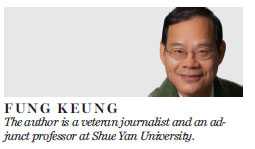The bigger picture of graduates' prospects
Updated: 2015-09-29 09:59
By Fung Keung(HK Edition)
|
|||||||
Last month, a Hong Kong newspaper printed a story based on two Chinese University of Hong Kong (CUHK) researchers' academic paper published in a journal recently. The researchers should be lauded for looking into such an important issue: the job prospects of university graduates in Hong Kong.
Unfortunately, the scholars appear to have failed in painting a complete picture of the job opportunities for local university graduates. In presenting statistics, it is desirable that both absolute numbers and percentages are included to enhance understanding.
The two researchers from CUHK suggest that their findings point to the downward social mobility of university graduates. Such a conclusion, however, is debatable. And the newspaper's headline, "Fewer youngsters with degrees land middle-class jobs", also seems to be misleading, to say the least.
The researchers and the newspaper drew their conclusions based on the following statistics. Only 73.4 percent of university graduates managed to secure a middle-class position (manager, administrator, professional or associate professional) in 2011, compared with 82.5 percent in 2001.
The decline was about 9 percentage points. Yet, the scholars and the newspaper failed to present the fact that the number of university graduates has expanded exponentially in the past decade or so. In presenting statistics, it is well-advised to compare apples with apples. Although in percentage terms the findings are not incorrect, they do not tell the full and complete picture.
In 2001, there were about 15,000 university graduates. But the number of young people graduating with bachelor's degrees has surged to about 24,000 in recent years. In terms of numbers, there were 12,300 university graduates landing middle-class positions in 2001. The number has gone up to 17,600 in 2011. In fact, there are more (not less as stated by the researchers) youngsters with bachelor's degrees landing middle-class jobs (about 5,000 more).
In recent years, affiliates of local universities and private higher-education institutions have offered about 8,000 year-one degree places for high-school leavers (compared to 16,000 government-funded places). These institutions include HKU SPACE Community College (a University of Hong Kong affiliate), Tung Wah College (a unit of Tung Wah Hospital) and Hang Seng Management College (a private institution).
Many of their programs are fully accredited by the Hong Kong government. Indeed, the government website (www.ipass.gov.hk) states that there are a total of 23 such institutions in Hong Kong today. This compares with only a fraction of this number about 10 years ago.
The researchers stated that "the findings reflect that the opportunity for young people of taking up middle-class postings has dropped whereas their elevated level of education has failed to bring them any advantage in the labor market". But the figures show that the number of youngsters getting middle-class jobs has increased by 43 percent in the 10 years to 2011.
There is always the issue of demand and supply in the labor market. While the number of degree places jumped by 60 percent between 2001 and 2011, GDP in Hong Kong only grew by 45 percent during the same period. It goes without saying that some young people with a bachelor's degree will work as office clerks or in sales, jobs that were occupied by high-school leavers a decade ago. But few of them are complaining.
A survey in 2014 found that only about a quarter of people aged between 18 and 34 were unhappy with the chances they were given in developing their careers. Such a percentage appeared low in light of the job-hopping characteristics of many local young employees.
The two researchers, however, did do a good job in urging the government to provide more government-funded places in the eight local universities, as government-funded universities usually have better facilities and high-quality academic staff - helping their students gain a competitive edge over privately funded institutions.

(HK Edition 09/29/2015 page8)